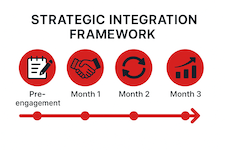Is there really such a difference between the quality of developers in the US and Latin America?

Of course, perhaps the fault is ours; we haven’t provided the best candidates, and the candidates we presented are not representative of the best engineers in Latin America. Perhaps, but...
Here’s the situation:
We’ve worked in tech talent long enough (15 years) to know what makes a great fit for our clients, and usually, our recommendations are accepted.
A prominent US airline asked us to provide candidates with Golang/Go as well as DevOps expertise, on top of >5 years in software development.
We filtered approximately 65 applicants, presented 7, and 2 made it to the second round, and only one made it to the final round. He was a stellar candidate: 14 years in software development, expert level in Go as well as DevOps. Had been promoted by almost all his employers and was currently tech lead in charge of a mid-sized team of developers. He was mature, concise, professional, fluent in English, and had experience in corporates and startups for international clients.
The outcome shocked us. The line from the Airline that stuck in my head was ‘We consider him a junior developer’.
The feedback from the candidate didn’t reveal anything that justified the client’s decision. He answered all the questions correctly.
To answer the question I asked at the beginning: no, it’s a dumb question. Talent is distributed evenly, (opportunities not so much), and it probably boils down to the following:
1. Cultural differences: a tech recruiter at the top of the market looks for more than just the correct answer, they want to see logic, to be presented with options and a logical framework that a recommendation is based on. And a candidate can be excused for simply answering the question, and not elaborating on the fine detail.
2. Deference: Generally speaking, candidates in Latin America are respectful to a fault. I’ve seen developers in awe of US employers to the point that they are often timid and nervous in interviews. And this often doesn’t wash with tech interviewers who are looking for confident answers, presented by someone at the top of their game.
3. Exposure and opportunity: top US engineers may have studied CS at MIT or Stanford and gone on to work at a top tech company such as Microsoft, Facebook, Alphabet, Amazon, or Apple. These engineers are also exposed to conferences, professional networks, and other types of resources that are harder to come by in LATAM.
In conclusion, in our opinion, there may be more high-caliber candidates in the US, but there are definitely many (understatement) excellent candidates in Latin America whose expertise and experience are at least as good as the best the US has to offer. And with so much focus now by governments in Latin America to cultivate technology skills we see this pool of world-class talent as growing fast.
What do you think? Is there a gap? Are you an engineer and have you been surprised in your selection processes with US employers?











